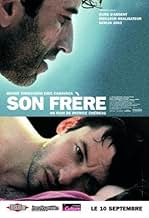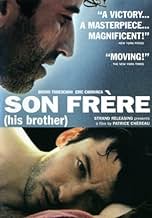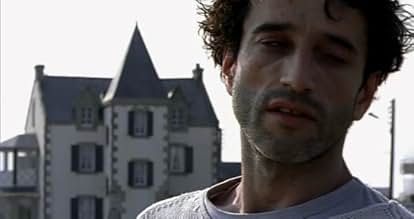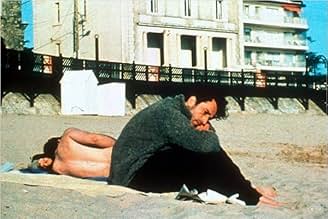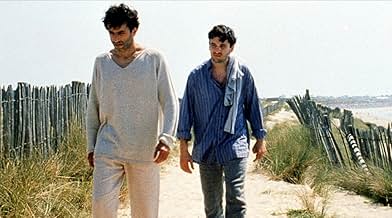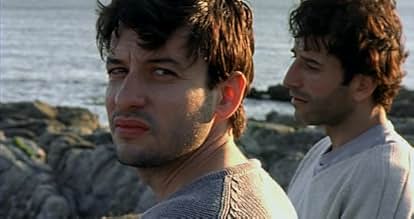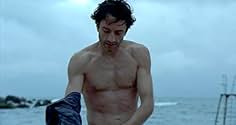AVALIAÇÃO DA IMDb
6,9/10
2 mil
SUA AVALIAÇÃO
Adicionar um enredo no seu idiomaTwo brothers with a problematic relationship in the past, find together again when the elder one gets a dangerous disease and asks his brother to accompany him to several doctors.Two brothers with a problematic relationship in the past, find together again when the elder one gets a dangerous disease and asks his brother to accompany him to several doctors.Two brothers with a problematic relationship in the past, find together again when the elder one gets a dangerous disease and asks his brother to accompany him to several doctors.
- Direção
- Roteiristas
- Artistas
- Prêmios
- 2 vitórias e 4 indicações no total
- Direção
- Roteiristas
- Elenco e equipe completos
- Produção, bilheteria e muito mais no IMDbPro
Avaliações em destaque
The other like part of yourself. Shadows of past and a fragile present. Fear, emotions and long expectation. And the pain like moral mirror.
A meditation-film. Beach, sea and a hospital. Blood-sick and an ambiguous form of love. Questions, illusions, slices of hate and way of survive. A strange passing and subtle exploration of relation between brothers.
Depressing images and circles of freedom. Nooks of gestures and aspects of reality like symbols of fiction. Compasion like only instrument to define the rules of strange and cold universes. And colors of sentiments essence.
The end of film marks the last words of a subtle poem. The shadow of ataraxia after a long trip, taste of peace after a terrible fight, touch of new images and possibilities after a powerful interior tempest.
A meditation-film. Beach, sea and a hospital. Blood-sick and an ambiguous form of love. Questions, illusions, slices of hate and way of survive. A strange passing and subtle exploration of relation between brothers.
Depressing images and circles of freedom. Nooks of gestures and aspects of reality like symbols of fiction. Compasion like only instrument to define the rules of strange and cold universes. And colors of sentiments essence.
The end of film marks the last words of a subtle poem. The shadow of ataraxia after a long trip, taste of peace after a terrible fight, touch of new images and possibilities after a powerful interior tempest.
10EdgarST
This was Chéreau's best since "L'homme blessé", an excellent little film about affection, compassion, brotherly love, death, courage. The proposed situation (an older brother dying from a blood disease seeks the support of his younger brother, somehow evoking the most critical days of the spread of AIDS) is handled with a calm tone, in a rather "Cartesian approach", not lacking bursts of emotion, but avoiding facile sentimentality. Fine script by Chéreau and Anne-Louise Trividic, from a novel by Philippe Besson, with a clever structure intersecting different planes of time, plus good performances all over, especially by Bruno Todeschini and Éric Caravaca, and firm direction by Patrice Chéreau.
I saw Son Frere recently in Montreal in the original French (no subtitles). It certainly was a "brooding" dark film that really concentrated on closeups and detail in the European tradition. For me, the changes in time and settings did not take away from the relationship theme of the two brothers and their gradual reconciliation. I thought the detailed hospital scenes were a bit long but very realistic, though sombre. Ironically, I did not find the film depressing as it gave hope that something good comes in times of crisis. I will remember the film more for the two main actors, who I think were very well cast in these roles. It was more like watching a play or "the real thing" with long moments of silence or little spoken to reflect. Not a film that may have "mass appeal" but worthwhile seeing and memorable.
French director Patrice Chereau's Son Frére is an almost unbearably intimate story about the disconnect between two brothers that, like The Death of Mr. Lazarescu, provides a clinical dissection of the sterility of hospitals and their failure to confront the human dimension of illness. Based on the Philippe Besson novel, "Son Frére," the film centers on the relationship between two brothers, one gay, the other straight. Luc (Eric Caravaca) is a gay man who has been estranged from his older brother Thomas (Bruno Todeschini), a graphic artist, though they live close to each other in Paris. Though there is little back story, the suggestion is that their relationship was sabotaged by homophobia.
When Thomas calls Luc on his cell phone to tell him that he is suffering from a potentially fatal blood disorder, Luc goes to the hospital to be with him, cutting off his relationship with his lover Vincent (Sylvain Jacques). Luc, at first resentful, tells his brother that the only reason he is there is because he was asked and his feelings of betrayal are evident. Neither their father (Fred Ulysse) nor their mother (Antoinette Moya) offer any comfort, only exacerbating the situation by telling Luc that they wish it would have been him instead of Thomas. Thomas' girlfriend Claire (Nathalie Boutefeu) is also of little help, feeling powerless to offer Thomas much assistance.
Thomas' platelet count continues to drop and, as the possibility of a fatal hemorrhage increases, the doctors decide to remove his spleen but it does not produce the desired result. The film shifts between scenes at the hospital and ones at Luc's house near the seaside, cutting backwards and forwards in time. Despite inter-titles that identify the month in which the sequence is taking place, however, the chronology is confusing. As the illness progresses and the toll of hospital corridors, waiting rooms, and invasive procedures multiply, fatigue and inevitability sets in as the brothers struggle to reawaken some of their previous intimacy.
Luc shares a touching anecdote from their childhood about how Thomas saved him from school bullies and when his brother seems ready to give up, Luc rubs his back searching for some meaningful way of connecting. When they finally proclaim their love for one another, however, the cycle of resignation and despair has already gone too far to be reversed and Luc seems to passively accept its inevitability. In one of the film's most affecting scenes, we watch the excruciatingly slow and painstaking removal of all Thomas' body hair with an electric shaver in preparation for his operation by cheery, smiling technicians.
Another moving scene, perhaps the most emotional in the entire film, is the casual meeting between Luc and a 19-year old patient (Robinson Stevenin) in the hospital hallway. The patient is distraught about the possibility of another major surgery and Luc instinctively reaches out to embrace him. On the whole, however Son Frére is not an overtly emotional experience. To its credit, it studiously avoids displays of sentiment or peak dramatic moments but its affect can be flat and distancing. We long for a breakthrough or some catharsis that will bring release from all the bleakness, but Chereau does not offer any and Son Frére leaves us only with a feeling of sadness and a sober reflection on any damaged relationships of our own.
When Thomas calls Luc on his cell phone to tell him that he is suffering from a potentially fatal blood disorder, Luc goes to the hospital to be with him, cutting off his relationship with his lover Vincent (Sylvain Jacques). Luc, at first resentful, tells his brother that the only reason he is there is because he was asked and his feelings of betrayal are evident. Neither their father (Fred Ulysse) nor their mother (Antoinette Moya) offer any comfort, only exacerbating the situation by telling Luc that they wish it would have been him instead of Thomas. Thomas' girlfriend Claire (Nathalie Boutefeu) is also of little help, feeling powerless to offer Thomas much assistance.
Thomas' platelet count continues to drop and, as the possibility of a fatal hemorrhage increases, the doctors decide to remove his spleen but it does not produce the desired result. The film shifts between scenes at the hospital and ones at Luc's house near the seaside, cutting backwards and forwards in time. Despite inter-titles that identify the month in which the sequence is taking place, however, the chronology is confusing. As the illness progresses and the toll of hospital corridors, waiting rooms, and invasive procedures multiply, fatigue and inevitability sets in as the brothers struggle to reawaken some of their previous intimacy.
Luc shares a touching anecdote from their childhood about how Thomas saved him from school bullies and when his brother seems ready to give up, Luc rubs his back searching for some meaningful way of connecting. When they finally proclaim their love for one another, however, the cycle of resignation and despair has already gone too far to be reversed and Luc seems to passively accept its inevitability. In one of the film's most affecting scenes, we watch the excruciatingly slow and painstaking removal of all Thomas' body hair with an electric shaver in preparation for his operation by cheery, smiling technicians.
Another moving scene, perhaps the most emotional in the entire film, is the casual meeting between Luc and a 19-year old patient (Robinson Stevenin) in the hospital hallway. The patient is distraught about the possibility of another major surgery and Luc instinctively reaches out to embrace him. On the whole, however Son Frére is not an overtly emotional experience. To its credit, it studiously avoids displays of sentiment or peak dramatic moments but its affect can be flat and distancing. We long for a breakthrough or some catharsis that will bring release from all the bleakness, but Chereau does not offer any and Son Frére leaves us only with a feeling of sadness and a sober reflection on any damaged relationships of our own.
Breaking with the visual pyrotechnics and operatic flourishes he's been associated with in the past, this devestatingly intimate drama solidifies Patrice Chereau's reputation as one of the greatest filmmakers of our time. The simple story (adapted by Chereau and Anne-Louise Trividic from Philippe Besson's novel) deals with two somewhat estranged brothers -- one gay, one straight -- who become reconciled when one of them (the straight one) contracts a rare blood disease and begins the process of dying. As the slightly smug, high-living brother brought low by death Bruno Todeschini is excellent as always. But the revelation is Eric Caravaca as the surviving brother. His fresh, unfussy performance grows in power as the situation goes from bad to worse. Catherine Ferran as the perfectly professional, but utterly unhelpful, doctor in charge is quietly frightening. Chereau regulars Sylvain Jacques and Pascale Greggory drop in for a telling turn or two, and Maurice Garrel (father of filmmaker Philippe Garrel) has a few nice scenes as an old man they meet at their beach house. But over all it's primarily a two-hander of intense intimacy. There's no music until the climax when the voice of Marianne Faithfull let's loose on the soundtrack with a song she co-wrote with Angelo Bandalamenti. And when the end credits finally roll you'll probably find yourself staggering out the door like I did. If you've ever lost someone close to you you'll feel this movie right inside your skin.
Você sabia?
- Trilhas sonorasSleep
Performed by Marianne Faithfull
Written by Marianne Faithfull, Frank McGuinness (as Frank McGuiness), Angelo Badalamenti
© ANLON MUSIC Co. (P) 1995 ISLAND RECORDS INC.
Avec l'aimable autorisation de Universal Music Projets Spéciaux
Principais escolhas
Faça login para avaliar e ver a lista de recomendações personalizadas
- How long is His Brother?Fornecido pela Alexa
Detalhes
Bilheteria
- Faturamento bruto nos EUA e Canadá
- US$ 22.834
- Fim de semana de estreia nos EUA e Canadá
- US$ 6.802
- 4 de abr. de 2004
- Faturamento bruto mundial
- US$ 131.195
- Tempo de duração1 hora 32 minutos
- Cor
- Mixagem de som
- Proporção
- 1.85 : 1
Contribua para esta página
Sugerir uma alteração ou adicionar conteúdo ausente


